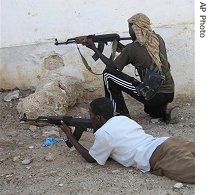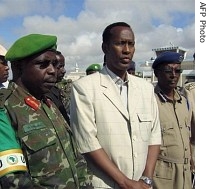-
(单词翻译:双击或拖选)
Mogadishu
11 June 2007
In a new sign of trouble for Somalia's transitional government, elders of the Hawiye clan1, which dominates in the capital, are threatening to boycott2 a national reconciliation3 conference, scheduled to begin in five days. Meanwhile, the chairman of the reconciliation committee tells VOA there is a chance the peace talks may be delayed again for the third time. Correspondent Alisha Ryu reports from Mogadishu.
 |
| Hawiye clan soldiers fire towards Ethiopian troops in Mogadishu, 19 Apr 2007 |
Haji Omar is the chairman of the newly-formed Hawiye Elders Congress, a political body established to unite fractious sub-clans6 and to function as the voice of the Hawiye people.
The Hawiye leader says the interim7 government has failed to engage clan elders in any meaningful talks before the conference and has not responded to the list of demands they submitted to the reconciliation committee in early May.
Haji Omar says that is why the Hawiye believe the June 16 talks will not be held in the interest of all of the Somali people.
The participation8 of the Hawiye clan is crucial to the talks, not only because it is one of the largest clans in Somalia, but because the clan dominates in the capital, where the government is struggling to assert full control.
A violent insurgency9 erupted in February, a month after the Ethiopian-backed interim government defeated Somalia's Islamist movement and took power in Mogadishu.
Ensuing battles between insurgents10 and Ethiopian troops have killed nearly 2,000 people and have caused hundreds of thousands of others to flee the city.
The insurgents are believed to be a mix of Islamist fighters and Hawiye militiamen. Both groups are angry over the government's close relationship with Ethiopia and the presence of Ethiopian troops in Somalia.
Many Hawiye clan members also believe that President Abdullahi Yusuf's powerful rival clan, the Darod, are using the presidential office to lay down the groundwork to weaken and marginalize the Hawiye.
They criticize Hawiye members in the interim government, such as Prime Minister Ali Mohamed Gedi and the chairman of the national reconciliation committee, Ali Mahdi Mohamed, as doing little to protect Hawiye interests.
 |
| Somali Prime Minister, Ali Mohamed Gedi (center), 17 May 2007 |
"Friends and brothers and sisters are not in place," he said. "This [conference] is based according to the transitional federal charter. The selection mandate13 has been given to the elders and traditional leaders of each and every clan. So, this is the way and nobody can change it, even myself, even the president, even the parliament. No."
Western donor14 nations, particularly the European Union, have made financial support of the reconciliation conference conditional15 on the government's willingness to hold inclusive, transparent16 talks.
On Sunday, committee chairman, Ali Mahdi Mohamed, told VOA that donors17 have only released a fraction of the money needed. He says this may cause the start of the conference to be delayed one to two weeks.
The conference has been postponed18 twice, in April and in May, because of insecurity in the capital.
 收听单词发音
收听单词发音
1
clan

|
|
| n.氏族,部落,宗族,家族,宗派 | |
参考例句: |
|
|
|
2
boycott

|
|
| n./v.(联合)抵制,拒绝参与 | |
参考例句: |
|
|
|
3
reconciliation

|
|
| n.和解,和谐,一致 | |
参考例句: |
|
|
|
4
promising

|
|
| adj.有希望的,有前途的 | |
参考例句: |
|
|
|
5
get-together

|
|
| n.(使)聚集;(使)集合 | |
参考例句: |
|
|
|
6
clans

|
|
| 宗族( clan的名词复数 ); 氏族; 庞大的家族; 宗派 | |
参考例句: |
|
|
|
7
interim

|
|
| adj.暂时的,临时的;n.间歇,过渡期间 | |
参考例句: |
|
|
|
8
participation

|
|
| n.参与,参加,分享 | |
参考例句: |
|
|
|
9
insurgency

|
|
| n.起义;暴动;叛变 | |
参考例句: |
|
|
|
10
insurgents

|
|
| n.起义,暴动,造反( insurgent的名词复数 ) | |
参考例句: |
|
|
|
11
accusations

|
|
| n.指责( accusation的名词复数 );指控;控告;(被告发、控告的)罪名 | |
参考例句: |
|
|
|
12
deliberately

|
|
| adv.审慎地;蓄意地;故意地 | |
参考例句: |
|
|
|
13
mandate

|
|
| n.托管地;命令,指示 | |
参考例句: |
|
|
|
14
donor

|
|
| n.捐献者;赠送人;(组织、器官等的)供体 | |
参考例句: |
|
|
|
15
conditional

|
|
| adj.条件的,带有条件的 | |
参考例句: |
|
|
|
16
transparent

|
|
| adj.明显的,无疑的;透明的 | |
参考例句: |
|
|
|
17
donors

|
|
| n.捐赠者( donor的名词复数 );献血者;捐血者;器官捐献者 | |
参考例句: |
|
|
|
18
postponed

|
|
| vt.& vi.延期,缓办,(使)延迟vt.把…放在次要地位;[语]把…放在后面(或句尾)vi.(疟疾等)延缓发作(或复发) | |
参考例句: |
|
|
|















